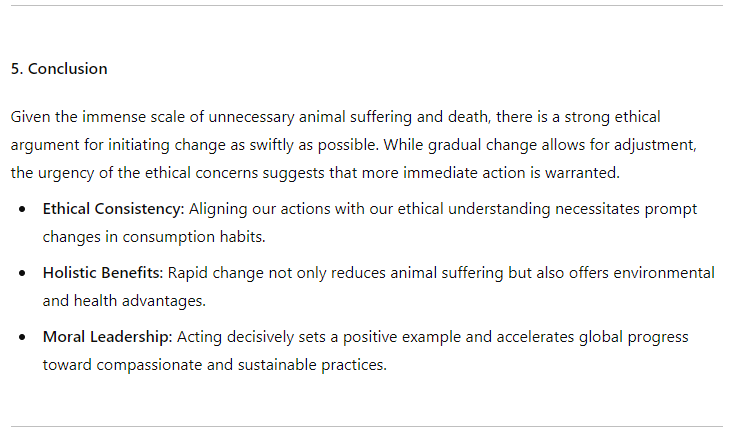this post was submitted on 10 Oct 2024
-1 points (0.0% liked)
vegan
2582 readers
9 users here now
Please also check out vegantheoryclub.org for a great set of well-run communities for vegan news, cooking, gardening, and art. It is not federated with LW, but it is a nice, cozy, all-in-one space for vegans.
We ask that the you have an understanding on what veganism is before engaging in this community.
If you think you have been banned erroneously, please get in contact with one of the other mods for appeals.
Moderator reports may not federate properly and may delay moderator action. Please DM an active mod if an abusive comment remains after reporting it.
Welcome
Welcome to c/[email protected]. Broadly, this community is a place to discuss veganism. Discussion on intersectional topics related to the animal rights movement are also encouraged.
What is Veganism?
'Veganism is a philosophy and way of living which seeks to exclude—as far as is possible and practicable—all forms of exploitation of, and cruelty to, animals ...'
— abridged definition from The Vegan Society
Rules
The rules are subject to change, especially upon community feedback.
- Discrimination is not tolerated. This includes speciesism.
- Topics not relating to veganism are subject to removal.
- Posts are to be as accessible as practicable:
- pictures of text require alt-text;
- paywalled articles must have an accessible non-paywalled link;
- use the original source whenever possible for a news article.
- Content warnings are required for triggering content.
- Bad-faith carnist rhetoric & anti-veganism are not allowed, as this is not a space to debate the merits of veganism. Anyone is welcome here, however, and so good-faith efforts to ask questions about veganism may be given their own weekly stickied post in the future.
- before jumping into the community, we encourage you to read examples of common fallacies here.
- if you're asking questions about veganism, be mindful that the person on the other end is trying to be helpful by answering you and treat them with at least as much respect as they give you.
- Posts and comments whose contents – text, images, etc. – are largely created by a generative AI model are subject to removal. We want you to be a part of the vegan community, not a multi-head attention layer running on a server farm.
- Misinformation, particularly that which is dangerous or has malicious intent, is subject to removal.
Resources on Veganism
A compilation of many vegan resources/sites in a Google spreadsheet:
Here are some documentaries that are recommended to watch if planning to or have recently become vegan:
Vegan Fediverse
Lemmy: vegantheoryclub.org
Mastodon: veganism.social
Other Vegan Communities
General Vegan Comms
[email protected]
[email protected]
Circlejerk Comms
[email protected]
[email protected]
Vegan Food / Cooking
[email protected]
[email protected]
[email protected]
Attribution
- Banner image credit: Jean Weber of INRA on Wikimedia Commons
founded 1 year ago
MODERATORS
